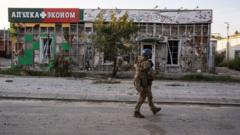Lebanon's parliament has broken a two-year stalemate by electing military leader Joseph Aoun as president, marking a crucial step towards stability in a nation beset by economic turmoil and conflict.
Lebanon Elects New President After Years of Political Stalemate

Lebanon Elects New President After Years of Political Stalemate
Lebanese Lawmakers Select Joseph Aoun to Lead Amid Ongoing Crises
In a significant political development, Lebanon's fragmented Parliament has finally elected a new president, Joseph Aoun, after enduring over two years of gridlock. This election marks a vital movement towards establishing a stable government aimed at steering Lebanon out of a profound economic crisis and the devastating aftermath of recent warfare.
General Joseph Aoun, previously the commander of the Lebanese military, was elected by a substantial majority during the second round of voting, having originally fallen short of the necessary votes in the first round. This breakthrough is pivotal for forming a government that can take the reins of a nation marred by political paralysis, economic downfall, and the repercussions of armed conflict, particularly the war between Israel and the Lebanese armed group Hezbollah.
The chaotic electoral process reflects Lebanon's current political climate, as the nation grapples with a string of humanitarian adjustments following severe economic changes and lack of governance. The lingering war with Israel has inflicted about $8.5 billion in damages, necessitating urgent financial support which, according to the international community—including influential nations like the United States—appears dependent on the election of a new President.
Analysis suggests that Hezbollah, traditionally one of the most significant political forces in Lebanon, is now under considerable pressure to concede ground, especially given the extent of the current economic crisis and the group's weakened standing post-conflict. With Joseph Aoun’s election as president, hope looms for a collective effort to recalibrate governance, address financial hardships, and stabilize regional tensions amid an evolving geopolitical landscape.
General Joseph Aoun, previously the commander of the Lebanese military, was elected by a substantial majority during the second round of voting, having originally fallen short of the necessary votes in the first round. This breakthrough is pivotal for forming a government that can take the reins of a nation marred by political paralysis, economic downfall, and the repercussions of armed conflict, particularly the war between Israel and the Lebanese armed group Hezbollah.
The chaotic electoral process reflects Lebanon's current political climate, as the nation grapples with a string of humanitarian adjustments following severe economic changes and lack of governance. The lingering war with Israel has inflicted about $8.5 billion in damages, necessitating urgent financial support which, according to the international community—including influential nations like the United States—appears dependent on the election of a new President.
Analysis suggests that Hezbollah, traditionally one of the most significant political forces in Lebanon, is now under considerable pressure to concede ground, especially given the extent of the current economic crisis and the group's weakened standing post-conflict. With Joseph Aoun’s election as president, hope looms for a collective effort to recalibrate governance, address financial hardships, and stabilize regional tensions amid an evolving geopolitical landscape.






















